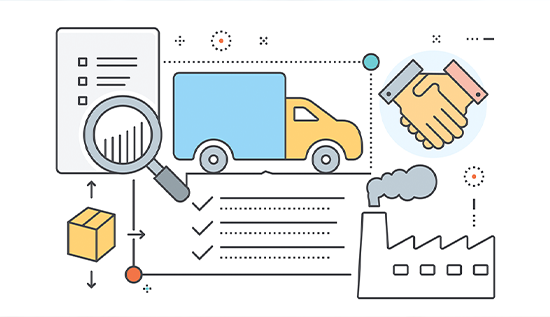Supply Chain KPI
Key Performance Indicators (KPIs) play a crucial role in supply chain management by providing measurable metrics to assess performance, identify areas for improvement, and drive strategic decision-making.
ALICOG can help you defining the right KPIs for your organization to monitor, measure, and optimize your supply chain performance.
Choosing the right KPIs ensures that your supply chain efforts are focused, measurable, and aligned with overall business objectives, leading to improved performance, reduced risks, and increased customer satisfaction.

- Performance Measurement: KPIs enable organizations to measure the performance of various aspects of the supply chain, including procurement, production, inventory management, logistics, and customer service. By tracking KPIs, your company can assess their performance against predefined targets and benchmarks, gaining insights into areas of strength and weakness.
- Visibility and Transparency: KPIs provide visibility into supply chain operations, allowing stakeholders to monitor performance in real-time and identify bottlenecks or inefficiencies. With transparent and accessible KPI data, organizations can make informed decisions, allocate resources effectively, and proactively address issues before they escalate.
- Continuous Improvement: KPIs serve as a foundation for continuous improvement initiatives within the supply chain. By setting specific, measurable, achievable, relevant, and time-bound (SMART) targets for KPIs, your organization can track progress over time and implement targeted improvement strategies to enhance efficiency, reduce costs, and enhance customer satisfaction.
- Risk Management: Certain KPIs, such as inventory turnover, supplier performance, and lead time variability, helps you assess and mitigate risks within the supply chain. By monitoring these KPIs, you can identify potential disruptions, proactively manage inventory levels, diversify supplier relationships, and implement contingency plans to minimize the impact of supply chain disruptions.
- Cost Optimization: KPIs related to cost metrics, such as total landed cost, transportation costs, and inventory carrying costs, enable organizations to identify opportunities for cost optimization and efficiency gains. By analysing cost-related KPIs, you can streamline processes, negotiate favourable terms with suppliers, optimize inventory levels, and reduce overall supply chain expenses.
- Customer Satisfaction: KPIs related to customer service, such as order fulfilment rate, on-time delivery performance, and order accuracy, help organizations assess their ability to meet customer expectations and deliver value. By focusing on customer-centric KPIs, you can enhance service levels, build customer loyalty, and gain a competitive advantage in the market.
- Strategic Alignment: KPIs align supply chain performance with organizational goals and objectives, ensuring that supply chain activities support broader business strategies. By selecting KPIs that align with strategic priorities, you can measure the impact of supply chain initiatives on overall business performance and drive alignment across departments and functions.



